ASPI’s China research: the big picture

In a piece titled ‘The think-tank behind Australia’s changing view of China’, the Australian Financial Review recently gave prominence to a few critics of ASPI’s China research. But instead of engaging with the research and its findings, the criticisms levelled were simple jibes: ‘one-sided’, ‘dystopian’, ‘brings shame to Australia’. That was a pity because ASPI’s China research is addressing head-on one of the most important challenges Australia faces.
For a long time there was a cosy consensus in Australian policymaking circles about how China would rise. It was assumed China would join the international system that had underpinned its economic success and participate in it, largely as a status quo power. As has now become very clear under President Xi Jinping, sadly, that assessment was wrong.
What has been remarkable about this major failure is the desire expressed by some to continue along the same path we were on before.
At the heart of Australia’s failure to accurately predict how China would rise was a failure to understand China under the control of the Chinese Communist Party. Across the Australian policymaking community, Australian think tanks and academia, the number of people with deep expertise on China were few and far between.
While lots of effort was thrown into understanding the Chinese economy, other critical areas were ignored and are still not well understood, such as technology transfer programs, united front activities, military modernisation and interference in diaspora communities. It can be difficult to talk about these more negative and challenging aspects of China’s rise, but, given how important China will be for Australia and the international system, it would be foolish to gloss over or ignore them.
Against this policy gap, what better way to understand China than by looking at what the Chinese government is saying it wants to do? ASPI’s researchers read Chinese-language documents and have the expertise to assess Chinese technology, political and military developments including through the lens of Chinese Australians who can draw analytical depth from understanding both societies.
That objective to clearly understand China is precisely why we set up a China research capability at ASPI. To bring empirical data to one of the most consequential policy debates that will engage the current generation of Australian decision-makers. ASPI has one of the largest concentrations of Chinese-language speakers in any think tank in the country. Their specialisations include China’s military, technology transfer, online censorship, smart cities, social credit and industrial espionage. Our China research runs across different thematic programs and, while it attracts attention, is still only a modest part of ASPI’s total research output.
The simple act of looking at what the Chinese government says it wants to do and is doing has produced some remarkable empirical research and insights into the type of state that Australia, and the world, is dealing with.
Our work analysing Chinese defence universities and Western academics’ support for Chinese weapons programs has raised important questions both here and overseas. This includes questions about the extent to which Australian taxpayer funding and university research should be used to build up an authoritarian state’s military capabilities and measures we might need to take to prevent collaborations on defence-related technologies. Research engagement with China is vital to the Australian university sector, but a small proportion of partnerships are problematic and threaten the integrity of some universities and academic freedom more broadly.
Our research on the Chinese state’s efforts to control and manipulate global debate on key issues has raised equally important questions about free speech, the integrity of democratic institutions and the privacy of people’s data. And our work on the global expansion of China’s technology giants has provided a massive dataset to help policymakers everywhere understand how Chinese companies that will be powerful players in critical new technologies like artificial intelligence differ from the private companies they are used to dealing with because of their links to the CCP, the laws they are obliged to comply with and their attitudes towards human rights abuses.
Of course, ASPI has no monopoly on the ability to trawl through CCP policy documents and statements to unearth new insights and shed light on the party’s stated plans for China and the rest of the world. It’s just that so few others in Australia and elsewhere invest significant time to do so.
ASPI doesn’t have an editorial line on China, but we have a very clear method for how we go about our research. What we focus on—no matter the country or theme—is original empirical research that, wherever possible, generates new data that can help inform better public policy. That requires researchers to trawl through masses of information in multiple languages over months and sometimes years in order to create new datasets to inform their analysis.
This focus on empirical research is grounded in the idea that analysis informed by the hard work of empirical research is the most valuable contribution we can make to the policy debate. People don’t have to agree with our analysis, but it at least provides a factual basis for a debate.
While I’m very glad ASPI’s research has its critics (how else could we have a debate?), a better outcome for Australia would be to debate the issues we face. There is no more urgent or important policy issue for Australia than to think through how to engage China. The more that debate is informed by data and clear-sighted analysis, the better.


